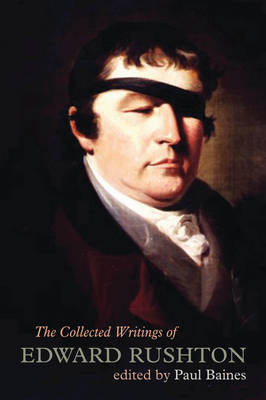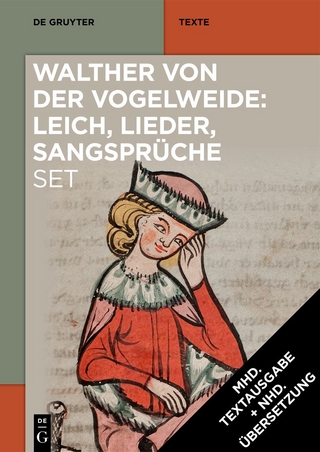
The Collected Writings of Edward Rushton
Liverpool University Press (Verlag)
978-1-78138-136-6 (ISBN)
- Titel ist leider vergriffen;
keine Neuauflage - Artikel merken
The edition brings together the known writings in poetry and prose of Edward Rushton (1756--1814). Blinded by trachoma after an outbreak on the slaving ship in which he was a young officer, Rushton returned to Liverpool to scratch a living as a publican, newspaper editor, and finally bookseller and publisher. In his day Rushton was a well-known Liverpool poet and reformer, with an impressively wide range of causes (the Liverpool Blind School, the Liverpool Marine Society, and many radical political groups). Many of his songs, particularly the marine ballads, were very familiar in Britain and America. In the later Victorian period, as a particular version of romanticism began to dominate literary sensibilities, Rushton’s overt politics fell from favour and he became rather obscure, at least by comparison with his like-minded (but much better off) friend William Roscoe. As the history of slavery abolition and other radical causes has come to be re-examined, the bicentenary of Rushton’s death, falling in November 2014, has suggested an opportunity to take a new look at his remarkable career and impressive body of work. There has never been a critical edition of Rushton’s poems. His own 1806 edition omits much, including what is his best-known work in modern times, the anti-slavery West-Indian Eclogues of 1787; the posthumous 1824 edition omits much from the 1806 collection while drawing in other work. The present edition works from the earliest datable sources, in newspapers, chapbooks, periodicals, and broadsides, providing a clean text with significant revisions and variants noted in the commentary. Unfamiliar words are glossed, and brief introductions and contextual commentaries, informed by the latest scholarship, are given for each piece of writing.
Edward Rushton (1756–1814) was a poet, writer, bookseller and abolitionist. After losing his own vision, he opened a school for the blind, the oldest continuous such school in the world. Paul Baines is Professor of English at the University of Liverpool and co-editor of The Wiley-Blackwell Encyclopedia of Eighteenth-Century Writers and Writing.
Acknowledgements
Introduction
Abbreviations and Short Titles
POEMS
An Irregular Ode (1781)
To the People of England (1782)
The Dismember’d Empire (1782)
West-Indian Eclogues (1787)
The Neglected Tars of Britain (1787)
Neglected Genius (1787)
Poor Ben (1790)
A Song Sung at the Commemoration of the Anniversary of the French Revolution, at Liverpool, July 14, 1791 (1791)
The Fire of Liberty (1792)
Seamen’s Nursery (1794)
Stanzas on the Anniversary of the American Revolution (1794)
The Tender’s Hold (1794)
Blue Eyed Mary (1796)
Elegy [To the Memory of Robert Burns] (c.1796)
Sonnet [The Swallow] (c.1796)
The Remedy [The Leviathan] (1797)
Song [Mary le More] (1798)
Written for the anniversary of the Liverpool Marine Society (1799)
Song. From Hymns, &c. for the Blind (c. 1799)
Lucy’s Ghost. A Marine Ballad (1800)
Sonnet by a Poor Man. On the approach of the Gout (1801)
Will Clewline (1801)
Ode. Sung at St. John’s Chapel, Lancaster, on Tuesday last, being the Anniversary of the Lancaster Marine Society (1801)
Ode. To France (1802)
The Maniac (1804)
Stanzas on Blindness (1805)
To a Redbreast (1806)
Solicitude (1806)
Toussaint to his Troops (1806)
On the Death of Hugh Mulligan (1806)
To a Bald-Headed Poetical Friend (1806)
The Ardent Lover (1806)
The Lass of Liverpool (1806)
Woman (1806)
Mary’s Death (1806)
The Halcyon (1806)
The Shrike (1806)
Briton, and Negro Slave (1806)
Absence (1806)
On the Death of a Much-Loved Relative (1806)
Entreaty (1806)
A Caution (1806)
The Throstle (1806)
The Complaint (1806)
The Pier (1806)
Mary (1806)
The Origin of Turtle and Punch (1806)
Parody (1806)
The Farewell (1806)
The Return (1806)
To the Gout (1806)
On the Death of Miss E. Fletcher (1806)
The Chase (1806)
The Winter’s Passage (1806)
Stanzas on the Recovery of Sight (1809)
Lines to the Memory of William Cowdroy (1814)
The Fire of English Liberty (1824)
Lines Addressed to Robt. Southey, Esq. (1817)
The Exile’s Lament (1824)
An Epitaph on John Taylor (1824)
To the Memory of Bartholomew Tilski (1824)
Jemmy Armstrong (1824)
Superstition (1824)
PROSE
Expostulatory Letter to George Washington (1797)
[Letter to Thomas Paine] (written c. 1800, published 1809)
[Monthly Retrospect of Politics] (1810)
Extracts from Letters (written 1805-1813, published 1814)
A Few Plain Facts relative to the Origin of the Liverpool Institute for the Blind (written 1804, published 1817)
An Attempt to prove that Climate, Food, and Manners, are not the Causes of the Dissimilarity of Colour (unknown date, published 1824)
[Letter to Samuel Ryley, 12 August 1814] (written 1814, published 1903)
[Mr Rushtons Remarks on the Slavery] (unknown date, previously unpublished)
[Letter to Thomas Walker, 30 January 1806] (written 1806, previously unpublished)
COMMENTARY
Abbreviations and Short Titles
Glossary
Poems
Prose
Appendix One: poems possibly by Rushton
Appendix Two: poems written to and about Rushton
| Erscheint lt. Verlag | 31.10.2014 |
|---|---|
| Reihe/Serie | Liverpool English Texts and Studies ; 65 |
| Verlagsort | Liverpool |
| Sprache | englisch |
| Maße | 163 x 239 mm |
| Themenwelt | Literatur ► Lyrik / Dramatik ► Lyrik / Gedichte |
| Geisteswissenschaften ► Sprach- / Literaturwissenschaft ► Anglistik / Amerikanistik | |
| Geisteswissenschaften ► Sprach- / Literaturwissenschaft ► Literaturgeschichte | |
| Geisteswissenschaften ► Sprach- / Literaturwissenschaft ► Literaturwissenschaft | |
| ISBN-10 | 1-78138-136-4 / 1781381364 |
| ISBN-13 | 978-1-78138-136-6 / 9781781381366 |
| Zustand | Neuware |
| Haben Sie eine Frage zum Produkt? |
aus dem Bereich


